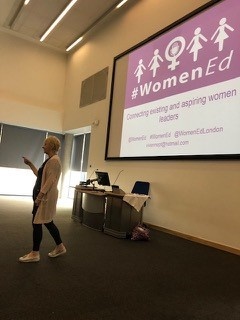
WomenEd is a grassroots movement which connects existing and aspiring women leaders in education. We began as an organisation for those who wanted to take their next leadership step into middle leadership, senior leadership, Headteacher or CEO roles. We quickly realised that women at all phases of their careers require support and guidance, and in true #WomenEd fashion, this led to events and support for Newly Qualified Teachers (NQT) and existing NQTs.
Fostering Confidence
One of the key taglines of #WomenEd is ‘10% braver’, which corresponds to one of the values of the movement—confidence. Where possible, we ask women to think about how they can be 10% braver and then we aim to support them in those steps.
When working with Initial Teacher Trainees (ITTs) in London, we heard women expressing low self-esteem and undervaluing their worth.1 Some ITTs reported they were made to feel that they were not ‘good enough’ to teach, even though they were recommended for Qualified Teacher Status (QTS). These women even considered returning to their previous roles as Teaching Assistants.
It became very clear to the #WomenEd network leaders in London that, if we are serious about supporting aspiring leaders, we need to ensure that we support those training to be teachers and Newly Qualified Teachers (NQTs) from the outset of their career. We now hold #WomenEd events to empower NQTs to embrace their roles confidently and to support them to be 10% braver.
Pre-leadership Struggles
This year, the Department for Education published its ‘Teacher Recruitment and Retention Strategy’ to address the challenges faced by teachers in the early stages of their career.2 It is also vital to stem the numbers of teachers leaving the profession within the first five years of which ‘around 6,000 teachers a year—27 per cent of all leavers in total—are women aged 30–39’.3
Yet, there are challenges when it comes to women making progress and moving forward as future teachers and leaders, even before they reach their NQT year. During the 2019 #WomenEd NQT unconference, future NQTs described how some male counterparts demanded and received changes to their timetables, work conditions and pay, while many female NQTs simply accepted the job offered to them.
In some cases, future NQTs said their own role was then changed due to a successful negotiation by a man. By listening to the lived experience of female NQTs, #WomenEd can empower them to engage confidently with their future employers to ensure that they are recruited, retained and make a valuable contribution to the learning communities they serve.

Establishing Mentorship
Confronted with these accounts, #WomenEd explored how NQTs could be supported more effectively. We held two unconferences in 2018 and 2019, supported by the #WomenEd London team and hosted by the University of East London. We focused on bespoke support to empower these capable individuals to make a difference. Mentoring expert Brad Johnson has often noted that the most effective mentoring is informal mentoring,4 and we made sure there was much informal mentoring happening at these events!
We learned that NQTs often need more guidance about choosing their first role, especially regarding their pay and conditions. Some related that they had been advised not to raise such questions, as they would not then be offered the job! We are very certain this was never said to a prospective male NQT.
The University of East London (UEL) has a strong mentoring process. They help future NQTs look at job searches and job applications, and show them how to complete the application form properly and how to develop an effective personal statement. Conversations explore how candidates need to match up the job specifications with what they are saying in their personal statements, so they demonstrate that they meet the criteria for the role they are applying for.
Candidates are also prepared for the interview day: how to teach a micro-lesson and how to work within a limited time frame. A mock interview opportunity was created to ensure that candidates are confident in how to respond to questions and how to engage with an interview panel.
Braver Negotiations
Based on the feedback from the 2018 #WomenEd event, it is clear that the interview is not where this process ends. UEL now build into the mentoring conversations how to engage with a future employer regarding pay, timetables, work conditions and terms. We wanted to make sure that future NQTs and NQTs had the confidence to have discussions regarding their pay.
We highlighted the importance of their own value and self-worth and presenting themselves to ensure that they are valued as professionals. When looking at the gender pay gap, women need to be 10% braver in discussions regarding their own pay and work conditions from the outset. Vivienne sees this as an essential support for women in education given that one of the most powerful forces holding women back is their own self-limiting beliefs and the unconscious or conscious bias of both male and female leaders.5
Setting up Support Networks
As a network lead for #WomenEd, Lizana realised that the work must not stop there. We need to discuss funding needs for mentoring and coaching much earlier on in women’s careers. There has been some funding available for Women Leaders in Education, for Leadership Equality and Diversity programmes and the Coaching Pledge. The Early Careers Framework (2019) has a large sum of money earmarked for Early Careers Framework entitlements and development and more needs to be done to support women at the start of their roles, when they enter a very complex work environment, as novices.
Informal mentoring support via grassroots organisations like #WomenEd supports women to thrive in their roles as a result of having clear conversations with their future employers about their needs. Their voices are heard, and they develop a strong and trusting relationship with their employers from the outset which can lead to retaining this member of staff for the future. Being part of #WomenEd can help early career teachers learn to value themselves and what they offer to schools.
Developing Strategies
One of our workshop facilitators, Kate Hufton, Associate Principal for Educator Development at Hornbeam Academy Trust in Walthamstow, described how she supports all NQTs to have a clear plan to ensure progression during their early career. Kate encourages NQTs to write their own reviews, so they become comfortable with acknowledging their strengths and progress. This is most important for women, who, stereotypically, undersell their worth.
Hornbeam Academy Trust is implementing the Early Career Framework early by building in more time for recently qualified teachers in their second year of teaching. In particular, Kate is concerned about those NQTs who are sole teachers of their subject in a secondary school. We need mentors in schools to be given the time and knowledge to publicise the range of established and grassroots networks that can support all teachers to develop as a professional throughout their career. These include subject associations, unions and the Chartered College of Teaching.
WomenEd and the College work collaboratively given many of its members are women. Lizana introduced our unconference participants to how the Chartered College can support NQTs and the Early Career Framework, as NQT members gain all the benefits of membership at a discounted rate for the first year.6

Achieving Success
At our 2019 unconference, future NQTs shared that they had negotiated the terms of their employment and salaries more confidently with positive outcomes. One Maths future NQT shared how she demonstrated that her previous experience would contribute to a positive impact on learners. The school employed her on a higher pay scale and timetabled her to work on her areas of expertise during her NQT year to build on her strengths and talents.
WomenEd’s support for NQTs is offered in London and we would like to share our practice and approaches regarding supporting NQTs across the UK so all our NQTs benefit from the success of this current initiative.
So, what #WomenEd will do is to model these practices to other women. The conversation about pay and terms of employment needs to become part of the recruitment process. Women need to be confident in our own abilities and self-worth. By doing this, we not only model to others that this is standard, we change the perceptions of employers of how women engage during recruitment cycles.
Being 10% braver has become a way of being for many in our #WomenEd community. Lizana was 10% braver when she shared our aims at a meeting of The Universities Council for the Education of Teachers, and she encouraged others to use #WomenEd and other grassroots networks to help develop NQTs.
By offering women entering the profession a life-long career network for NQTs, #WomenEd empowers them and gives them courage. We want to help women to have a long journey in teaching and to contribute their passion and dedication. We are proud that a tweet from our latest NQT unconference showed the impact of the day:
‘Feeling less stressed about starting my NQT year and more empowered and confident thanks to the most inspirational women from @WomenEdLondon today.’
Vivienne Porritt is Co-founder and Strategic Leader of #WomenEd and Vice President of Chartered College of Teaching.
Lizana Oberholzer is Network leader for @WomenEdLondon and UEL School Direct Programme Lead/Senior Lecturer.
Contacts:
- Twitter – @WomenEd
- Facebook – facebook.com/womened
- Website – womened.org
- Email – womenedleaders@gmail.com
References:
Kay, K. & Shipman, C. (2014, May). The Confidence Gap. The Atlantic. www.theatlantic.com/magazine/archive/2014/05/the-confidence-gap/359815/
Department for Education. (2019). Early Careers Framework. London: Department for Education.
Simons, J. (ed.). (2016). The importance of teachers: A collection of essays on teacher recruitment and retention. London: Policy Exchange. https://policyexchange.org.uk/wp-content/uploads/2016/09/the-Importance-of-Teachers.pdf
Johnson, W. B. (2007). On being a mentor. A guide for higher education faculty. Mahwah, NJ: Lawrence Erlbaum.
Porritt, V. & Featherstone, K. (2019). 10% braver: Inspiring women to lead education. London: Sage.
Chartered College of Teaching. (n.d.). NQT Membership. https://chartered.college/nqt-membership
Register for free
No Credit Card required
- Register for free
- Free TeachingTimes Report every month